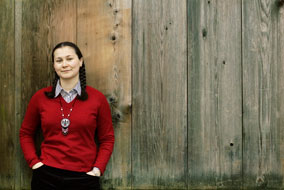
Michelle Cameron discovered her true calling as a Social Work grad - photo by Martin Dee UBC Reports | Vol. 52 | No. 5 | May 4, 2006
Social Work Grad Taps into Aboriginal Community’s Strengths
By Lorraine Chan
As a First Nations woman, Michelle Cameron has set her sights on working in a profession that holds as many rewards as minefields. Cameron will receive her Master of Social Work degree at Fall Congregation this November.
“You can sometimes feel torn because of that historical mistrust,” Cameron admits. “But one of the reasons I’ve decided to specialize in child welfare is that Aboriginal people need to be actively involved if we’re ever going to change the system.”
Cameron is a member of Burns Lake Band. On her mother’s side of the family, she is Carrier First Nations, Frog Clan. Her father’s side is Irish-Canadian.
“I see it as almost being bilingual — bringing an understanding of the concepts of the mainstream world, but making it culturally appropriate for the Aboriginal community.
For example, during her social work training, Cameron used a Medicine Wheel to conduct client assessments. She invited clients to draw a circle with four quadrants that represented their spiritual, mental, physical and emotional states.
“I find the Medicine Wheel is more holistic compared to conventional assessment tools, which can be too linear and deficit based,” says Cameron.
Overall, Cameron says she hopes to bring more balance to the social work picture. “There has been a lot of talk about alcoholism and fetal alcohol syndrome, but the huge strengths of the Aboriginal community are not acknowledged and are underutilized.”
She points to her mother and grandmother as two role models who sustain her and exemplify that strength.
“My grandmother is the backbone of the Reserve,” says Cameron. “She holds everyone together. My Mom is at UBC doing her PhD in educational studies right now. When you
consider that about only 30 per cent of Aboriginal students finish high school, that’s pretty amazing.”
Previously at UBC, Cameron earned a BA with a double major in English literature and classics. After a fruitless job search, she then signed up for a year-long Aircraft Engine Mechanic course at BCIT.
“Kind of cool, right? Jet engines!”
At that time, however, Cameron “didn’t know a screwdriver from a wrench,” but says she wanted to challenge herself, especially since her father holds tickets as an electrician and heavy-duty mechanic.
As it was, she finished fourth out of a class of 16 in the repair and maintenance of aircraft and helicopter gas turbine engines. Unfortunately, she got her certificate shortly after Sept. 11, 2001.
“The aviation industry went into a bad state, so there were no jobs.”
Meanwhile, Cameron began taking introductory social work courses by correspondence and felt something click.
“That was one of the first times that I felt passionate about what I was doing,” she says. “Coming from an Aboriginal family, all the issues are so relevant. Aboriginal people are over-represented as clients in almost every social service setting.” Cameron says that while Aboriginal people comprise eight per cent of B.C.’s population, 60 per cent of Vancouver children in the child welfare system are Aboriginal, and in northern B.C. that figure is 72 per cent or higher.
Cameron is currently gaining valuable hands-on experience doing full-time qualitative research and program evaluation with the B.C. Ministry of Children and Family Development.
In January 2007, she will start her PhD in Women’s Studies at Simon Fraser University. Her dissertation research will focus on “Two-Spirited” members in Aboriginal communities, and how historically some cultures valued gay and lesbian people for their greater understanding of male and female energy.
Also, by the end of this year, she and her partner are hoping to adopt a child, or possibly a sibling group.
“Adoption is something I’ve always wanted to do since I was little, knowing that so many Aboriginal children are in care.” |
